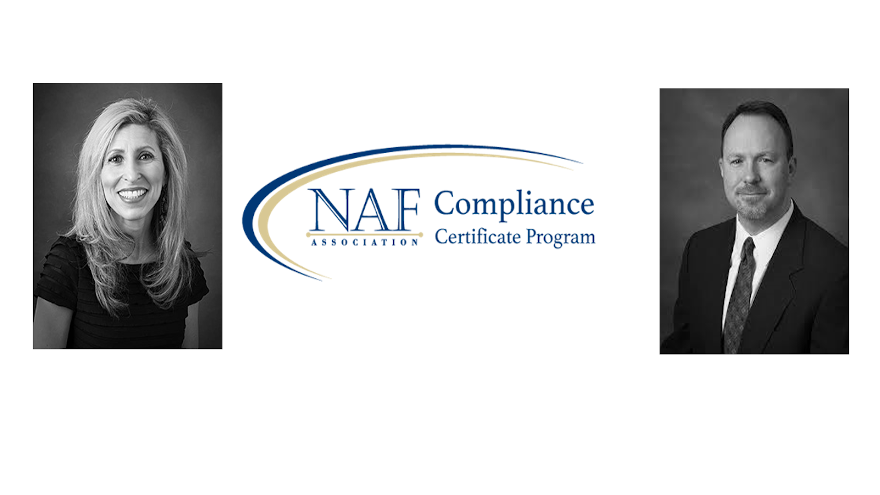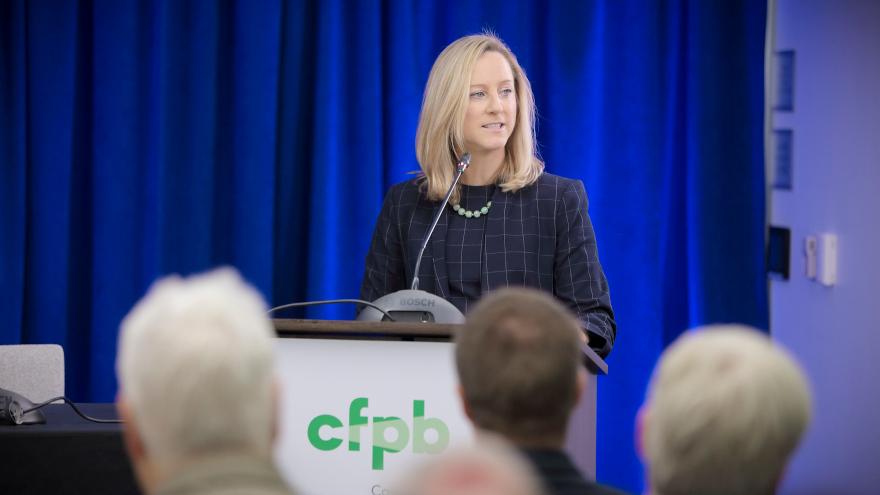Perhaps a primary reason recently Wolters Kluwer Lien Solutions hosted an informational webinar appeared through a participant survey conducted during the session.
Nearly 60% of the live webinar audience polled about portfolio management for auto financing responded that they felt only “somewhat prepared” for internal audits and regulatory exams assessing their practices.
After seeing that figure, Robert Inskeep, who spent 33 years as a national bank examiner at the Office of the Comptroller of the Currency (OCC) shared insights on how finance companies can protect themselves by improving loan portfolio management practices, tightening controls and performing self-assessments.
Inskeep also explored the Interagency examiner guidance and offer practical tips, from an OCC examiner’s perspective, on the potential consequences of poor execution of policies and procedures as banks deal with auto-financing challenges amid the COVID-19 pandemic.
Also on the agenda for the session titled, “Practicing Sound Loan Management in a COVID World,” was Wolters Kluwer’s Rick Vanko, senior product manager for iLien Motor Vehicle Solutions. Vanko shared advice on how to protect and perfect one’s motor vehicle collateral by addressing any possible loan exceptions, including managing the costs of those exceptions.
“While the regulatory and legal obligations behind auto lending remain unchanged, the ways in which lenders are adapting to operate in a disrupted economy present unexpected challenges. The increasing volume of loan defaults and car repossessions means significant challenges for lenders in managing higher loan portfolio risk while maintaining compliance with banking laws and regulations,” Wolters Kluwer said.
A recording of the webinar can be seen through the window at the top of this page.
Credit Acceptance’s legal team is facing a host of challenges from state attorneys general nowadays.
Earlier this month, the company acknowledged it received subpoenas from the AGs in Maryland and New Jersey. Then on Monday, Massachusetts attorney general Maura Healey filed a lawsuit against the finance company that specializes in the subprime market.
When recognizing the arrival of the subpoenas through a filing with the Securities and Exchange Commission, Credit Acceptance said, “We are cooperating with these inquiries and cannot predict the eventual scope, duration or outcome at this time. As a result, we are unable to estimate the reasonably possible loss or range of reasonably possible loss arising from these investigations.”
Back on March 18, 2016, Credit Acceptance said it received a subpoena from the Maryland attorney general related to the company’s repossession and sale policies and procedures in the state of Maryland. Then on April 3, the finance company said it received another subpoena from the Maryland AG in connection with the company’s origination and collection policies and procedures in the state of Maryland.
Then on Aug. 11, yet another subpoena from Maryland’s AG was received by Credit Acceptance, which said in the SEC filing that it most of the requests contained in the previous subpoenas, making additional requests, as well as expanding the inquiry to include 39 other states, including: Alabama, Alaska, Arizona, Arkansas, California, Connecticut, Delaware, Florida, Georgia, Hawaii, Illinois, Indiana, Iowa, Kansas, Kentucky, Louisiana, Maine, Michigan, Minnesota, Nebraska, Nevada, New Hampshire, New Jersey, New Mexico, North Carolina, North Dakota, Ohio, Oklahoma, Oregon, Pennsylvania, Rhode Island, South Carolina, South Dakota, Tennessee, Texas, Utah, Virginia, Washington and Wisconsin along with the District of Columbia.
New Jersey’s attorney general also sent its own subpoena to Credit Acceptance on Aug. 11, according to the company.
And then on Monday, the Massachusetts attorney general ramped up the legal activities with a lawsuit against Credit Acceptance for allegedly the company provided unfair and deceptive auto financing to thousands of Massachusetts consumers, providing investors with false or misleading information regarding auto securities they offered and engaging in unfair debt collection practices.
The complaint, filed in Suffolk Superior Court, alleges that since 2013, Credit Acceptance failed to inform investors that the company topped off the pools of loans that they packaged and securitized with higher-risk loans, despite claiming otherwise in disclosures to investors.
The complaint also alleges that Credit Acceptance has made high-interest subprime auto finance contracts with Massachusetts residents that the company knew customers would be unable to repay, in violation of state law.
Healey contends that while the company profited, contract holders experienced ruined credit, lost vehicles or down payments and were left with an average of approximately $9,000 of debt,
Additionally, Healey alleges that Credit Acceptance customers were subject to hidden finance charges, which resulted in contracts exceeding the usury rate ceiling of 21% mandated by state law.
“This company made unaffordable and illegal loans to borrowers, causing them to fall into thousands of dollars of debt and even lose their vehicles,” Healey said in a news release. “We are taking a close look at this industry and we will not allow companies to profit by violating our laws and exploiting consumers.”
In its lawsuit, the AG’s office also alleges that the company took excessive and illegal measures to collect debt from defaulted contract holders, including sending faulty notices to customers with repossessed vehicles, harassing consumers with unlawfully repetitious collections calls and overcharging consumers on their deficiencies.
The state is seeking relief for Massachusetts customers harmed by these alleged practices, as well as civil penalties and injunctive relief.
This lawsuit is part of Healey’s review of securitization practices in the subprime auto market — an industry-wide investigation that her office said remains ongoing.
Last year, Exeter Finance paid more than $5.5 million for its role in what the Massachusetts attorney said was financing unfair, subprime auto financing. And previously, the AG’s office secured $22 million from Santander Consumer USA for its role in financing subprime contracts for Massachusetts residents.
This matter involving Credit Acceptance is being handled by Healey’s Insurance and Financial Services Division.
Hudson Cook’s legal team has been recognized again; this time four attorneys are included in Chambers 2020 and 13 are included in The Best Lawyers in America 2021.
The firm recently highlighted partners Michael Benoit, Nikki Munro and Jean Noonan have been recognized by Chambers again with national rankings in the Chambers USA Guide in the Financial Services Regulation: Consumer Finance (Compliance) department.
Meanwhile, partner Catherine Brennan has been recognized with a national ranking in the Chambers FinTech USA Guide for Corporate, Securities & Financing.
Hudson Cook is ranked nationally for these departments.
Chambers recommendations are based on several months of research by a dedicated, independent team conducting hundreds of in-depth interviews with leading innovators and experts worldwide.
In addition, 13 Hudson Cook attorneys were selected for inclusion in The Best Lawyers in America 2021, including four who are celebrating 10 years or more on the list and six new honorees.
Partner Ryan Stinneford was also named the Best Lawyers 2021 Banking and Finance Law Lawyer of the Year in Portland, Maine.
Attorneys named to The Best Lawyers in America are recognized by their peers in the legal industry for their professional excellence in 148 practice areas. This year, nominees from 22,257 firms resulted in more than 67,000 recognized lawyers in those areas.
Along with Brennan, Munro and Stinneford, the Hudson Cook attorneys recognized among The Best Lawyers in America included:
— Hurshell Brown
— Lisa C. DeLessio
— Katherine Fisher
— Ronald Gorsline
— Thomas Hudson
— Eric Johnson
— Rebecca Kuehn
— Curtis Linscott
— Wingrove Lynton
— Thomas Quinn Jr.
Last week, the Federal Trade Commission announced it issued an administrative complaint against a marketer pushing a program involving dealership and potential pandemic stimulus benefits.
And this week over at the Consumer Financial Protection Bureau, officials said they will provide an additional 60 days for public comment on its request for information on how best to create a regulatory environment that expands access to credit and ensures that all consumers and communities are protected from discrimination in all aspects of a credit transaction.
The FTC action involved Traffic Jam Events and its owner, David Jeansonne II, charging multiple counts of deceptive conduct. The FTC explained administrative complaint mirrors a prior federal court complaint, which the regulator said it voluntarily dismissed to pursue a broader administrative proceeding.
The administrative complaint alleged that the marketing agency deceived consumers with mailers supposedly directing them to obtain federal COVID-19 stimulus benefits. The complaint also alleged that, in addition to the misleading COVID-19 mailers, the company sent flyers to consumers containing matching numbers indicating that consumers had won a valuable prize.
The FTC said consumers were then told they had to go to a dealership to “claim” the prize, but the small print on the back of the mailer revealed that there was only a 1-in-52,000 chance the consumer had actually won the prize specified.
In addition to FTC Act violations alleged related to the COVID-19 and prize mailers, the FTC’s complaint claimed the respondents violated the Truth In Lending Act and Regulation Z for failing to clearly disclose required credit information in their advertising.
The FTC vote to issue the administrative complaint and dismiss the federal proceeding was 4-0-1, with commissioner Rebecca Kelly Slaughter recorded as not participating.
The FTC reiterated that it issues an administrative complaint when it has “reason to believe” that the law has been or is being violated, and it appears to the commission that a proceeding is in the public interest.
“The issuance of the administrative complaint marks the beginning of a proceeding in which the allegations will be tried in a formal hearing before an administrative law judge,” officials said.
Update on CFPB project
Earlier this summer, the CFPB issued a request for information to seek public input on how best to create a regulatory environment that expands access to credit and ensures that all consumers and communities are protected from discrimination in all aspects of a credit transaction.
The bureau reiterated that the Equal Credit Opportunity Act and Regulation B make it unlawful for any creditor to discriminate against any applicant, with respect to any aspect of a credit transaction on the basis of race, color, religion, national origin, sex, marital status, or age; because all or part of the applicant’s income derives from any public assistance program; or because the applicant has in good faith exercised any right under the Consumer Credit Protection Act.
The original deadline for submissions was Oct. 2. The comment period will now close on Dec. 1.
“The information provided will help the bureau continue to explore ways to address regulatory compliance challenges while fulfilling the bureau’s core mission to prevent unlawful discrimination and foster innovation,” officials said in a news release.
The CFPB added the RFI is in lieu of a symposium the bureau had planned to host on ECOA issues this fall.
To read the RFI, go to this website.
Your children likely are completing their schoolwork online nowadays because of the coronavirus pandemic.
And the National Automotive Finance Association wants to make sure underwriting and collections professionals maintain their compliance knowledge in much the same way.
The NAF Association is pushing its compliance training for dealerships and finance companies online. The training that Hudson Cook partners Patty Covington and Eric Johnson previously presented through in-person classroom settings now is available digitally to benefit personnel who specialize in customer service, sales, collections or underwriting.
“COVID has rocked the world — literally — and has certainly required an adjustment from everyone, including the auto industry,” Covington said. “I’ve been blessed to be able to continue providing compliance legal advice from home, barking dogs and all. The pandemic has pushed the industry to innovate, realizing in weeks, years of technological advancement. Companies that were ahead of the curve on compliance definitely had an advantage. They could quickly determine what sale and/or financing models, payment accommodations, etc. could work and still be compliant.”
When courses are completed, NAF Association gives certificates that can be used in part to reinforce proof to regulators and other agencies about the robust level of compliance the dealership or finance company has.
“Compliance still matters, and we may see an even greater resurgence of scrutiny in 2021 if a new administration is sworn in,” Covington continued. “So, minding our compliance Ps and Qs still matters, even in a pandemic. The NAF Association’s programs on compliance are top notch — the content is rich and the practically on how it interrelates with the business just can’t be beat.”
To start a free trial or register staff, send a message to Diane Merino at [email protected] or call (717) 676-1533.
An Illinois franchised dealership is facing actions from the state attorney general for allegedly engaging in unfair and deceptive advertising and business practices
Illinois attorney general Kwame Raoul filed a lawsuit this week against Skokie Motor Sales, which operates as Sherman Dodge. Raoul said Sherman Dodge’s advertisements allegedly violated motor vehicle advertising regulations relating to sales events, trade-in values, discount substantiation and advertised prices.
In the lawsuit, filed in Cook County Circuit Court, Raoul alleged that Sherman Dodge’s ongoing deceptive practices have the potential to impact any Illinois consumer who purchases new or used vehicles from Sherman Dodge, as well as harm other dealerships across Illinois.
“Sherman Dodge knowingly and repeatedly took advantage of people through deceptive advertising — even after entering into an agreement with the attorney general’s office to stop using unlawful practices,” Raoul said in a news release. “I am committed to seeking enforcement against business and others who violate the law to take advantage of Illinois consumers.”
Sherman Dodge is an authorized Chrysler, Jeep and Dodge dealer located in Skokie, Ill., a northern suburb of Chicago. The AG’s office indicated Sherman Dodge advertises through various mediums, including its own website, third-party websites, newspapers and direct mailers.
In October 2014, the attorney general’s office opened an investigation into Sherman Dodge after receiving complaints from consumers who were unable to purchase vehicles advertised by the dealer. Consumers alleged that upon visiting Sherman Dodge to purchase a vehicle seen in advertisements, sales representatives would say the advertised vehicle was already sold, and would try to sell customers a different vehicle instead.
Additionally, Illinois’ top law enforcement segment said consumers alleged that they continued to see the same vehicle in advertisements for weeks following.
Following the investigation, Sherman Dodge entered into an Assurance of Voluntary Compliance (AVC) with the attorney general’s office in February 2016. Under the AVC, Sherman Dodge agreed to not sell a vehicle for more than the advertised price, advertise a vehicle that it has already sold or leased, guarantee a specific value for a trade-in vehicle, advertise a sale without reducing the selling price of vehicles listed in an advertisement by at least 5%, or include limited rebates in an advertised price.
Raoul’s new lawsuit alleges that Sherman Dodge has violated the AVC by continuing to engage in the illegal and deceptive activities prohibited by the AVC. The attorney general also claims Sherman Dodge further violated the Illinois Consumer Fraud and Deceptive Business Practices Act by deceptively using fake checks and coupons in its advertisements, failing to disclose a consumer’s potential responsibility for negative equity on a trade-in, failing to promptly pay off a loan on a traded-in vehicle, and advertising loan opportunities to those facing bankruptcy.
In the lawsuit, Raoul is seeking to prohibit Sherman Dodge from engaging in acts or practices that violate the law, rescind all contracts entered into between Sherman Dodge and consumers by use of unlawful methods and require Sherman Dodge to pay full restitution to consumers.
Raoul is also seeking a civil penalty of $50,000 per deceptive act or practice, with an additional $50,000 for each act or practice committed with the intent to defraud and an additional $10,000 for each act committed against a person 65 years of age or older.
Assistant attorney general Jacob Gilbert is handling the case for Raoul’s Consumer Fraud Division.
Along with its director giving testimony to both House and Senate committees, last week also included the Consumer Financial Protection Bureau issuing a request for information (RFI) to seek public input on how best to create a regulatory environment that expands access to credit and ensures that all consumers and communities are protected from discrimination in all aspects of a credit transaction.
The bureau reiterated that the Equal Credit Opportunity Act (ECOA) and Regulation B make it unlawful for any creditor to discriminate against any applicant, with respect to any aspect of a credit transaction on the basis of race, color, religion, national origin, sex, marital status, or age; because all or part of the applicant’s income derives from any public assistance program; or because the applicant has in good faith exercised any right under the Consumer Credit Protection Act.
“The information provided will help the bureau continue to explore ways to address regulatory compliance challenges while fulfilling the bureau’s core mission to prevent unlawful discrimination and foster innovation,” officials said in a news release.
The CFPB added the RFI is in lieu of a symposium the bureau had planned to host on ECOA issues this fall.
To read the RFI, go to this website.
Meanwhile, director Kathleen Kraninger also gave federal lawmakers updates when the Senate Banking Committee and the House Financial Services Committee conducted separate hearings. Kraninger offered details stemming from bureau’s spring 2020 semi-annual report, which included activities from last October through March.
“Clearly, the COVID-19 pandemic had a profound impact on the bureau’s work during the reporting period, one that will continue well into the future. These remain challenging times facing our nation and the world. Yet the uncertainty and dramatic change underscore the importance of the Bureau’s mission on behalf of American consumers,” Kranginer said.
Kraninger also mentioned that from Jan. 1 through July 26 consumers have submitted more than 270,000 complaints to the bureau and more than 14,000 complaints specifically reference coronavirus.
Each month from March through June also set a new monthly record for complaints, according to the CFPB director.
“Our consumer contact center and our online portal have operated efficiently and effectively throughout the pandemic to take consumer complaints and refer the complaints to companies for response,” Kranginer said.
While many of the developments that happened during the semi-annual report period involved the mortgage space, Kraninger also emphasized a CFPB activity that certainly can involve auto financing — its supervision authority.
“Supervision is the heart of this agency – something underscored by the percentage of our personnel and resources dedicated to conducting exams,” Kraninger said. “I am focused on ensuring we use this tool as effectively and efficiently as possible and that we apply it in a consistent way. Heading trouble off at the pass may not grab big headlines, but it will prevent a lot of headaches for consumers and industry.”
More details about the CFPB’s semi-annual report to Congress can be found here.
While it might seem like it’s already been a decade since the coronavirus pandemic started to impact our lives, it’s truly been 10 years since the signing of the Dodd–Frank Wall Street Reform and Consumer Protection Act, which opened the path for creation of the Consumer Financial Protection Bureau.
An array of industry experts and leaders shared with me how much the regulatory world has changed since the Dodd-Frank Act was signed on July 21, 2010, making it more challenging for the auto-finance industry. I’ll begin my recap of their perspectives with Celia Winslow, who is senior vice president of the American Financial Services Association.
“The biggest regulatory change for the auto finance industry since the Dodd-Frank Act is clearly the creation of the Consumer Financial Protection Bureau,” Winslow told me. “While auto-finance companies have been supervised and regulated at the state level, and under the jurisdiction of the Federal Trade Commission and subject to regulations issued by the Federal Reserve Board at the federal level, CFPB supervision marks the first time that these financial institutions have been supervised by a federal financial regulator.
“We appreciate the bureau’s recent focus on providing clear rules of the road for the auto-finance industry,” Winslow continued. “Without clarity, compliance can be challenging. AFSA continues to push for a bipartisan commission structure at the bureau to further enhance that clarity.”
Ignite Consulting Partners chief legal and compliance officer Steve Levine not only works with finance companies, but the firm also has franchised and independent dealerships on its nationwide client roster. Levine also made the connection of Dodd-Frank, the CFPB and other agencies.
“Dodd-Frank has had a profound impact on the auto finance industry,” Levine said. “The creation of the CFPB and the leadership role it has taken has had an obvious effect, but I also believe that the FTC has become a more active and aggressive agency because of the CFPB. And the relationships that the bureau forged with state regulators and attorneys general has also made a significant mark.
“Further, it's been my observation that much of the CFPB’s work in issuing guidance has been interpreted as ‘best practices’ and been used by plaintiffs’ lawyers as a playbook to bring an action against industry participants,” he added.
Whether coming from lawsuits from a private firm or an action from the CFPB, the past 10 years certainly have been active in the penalty front in the auto-finance segment. Here are just a couple of examples:
— In January 2016, the CFPB made an enforcement action against Herbies Auto Sales, then a buy-here, pay-here operator in Greeley, Colo., for what the bureau deemed to be abusive financing schemes, hiding auto finance charges and misleading consumers. The CFPB said Herbies was to pay $700,000 in restitution to harmed consumers, with a suspended civil penalty of $100,000.
— In April 2017, the CFPB said that Security National Automotive Acceptance Company (SNAAC) violated a consent order from 2015, demanding that the finance company make good on the redress it owes to consumers and pay an additional $1.25 million penalty. The CFPB initially ordered SNAAC, which specialized in working with servicemembers, to pay both redress and a civil penalty for illegal debt collection tactics, including making threats to contact servicemembers’ commanding officers about debts and exaggerating the consequences of not paying. The bureau determined SNAAC violated the 2015 order by failing to provide more than $1 million in refunds and credits, affecting more than 1,000 consumers.
— In December 2013, the CFPB in coordination with the Department of Justice ordered Ally Financial to pay $80 million in damages to harmed African-American, Hispanic, and Asian and Pacific Islander borrowers and $18 million in penalties because the agencies determined that more than 235,000 minority borrowers paid higher interest rates for their auto financing between April 2011 and December 2013 because of Ally’s “discriminatory” pricing system.
While Ally Financial now is a thriving company, SNAAC and Herbies eventually exited the business.
Also of note since Dodd-Frank arrived and the creation of the CFPB was the regulator’s controversial 2013 guidance on indirect auto financing. That guidance claimed dealer discretion on interest rates creates a “significant risk” of unintentional disparate impact discrimination and spelled out the bureau’s intention to pursue enforcement actions on that basis such as the Ally Financial penalty.
Federal lawmakers eventually got the guidance removed five years later.
Critics pointed out the CFPB’s theory was based on shaky methodology for determining disparate impact, and the guidance was put in place without comments from stakeholders, public hearings or studies of its effect on the cost of credit to consumers.
“Without seeking any public comment or studying the impact on consumer credit,” National Independent Automobile Dealers Association senior vice president of legal and government affairs Shaun Petersen said in 2018 when Congress took action, “and with no evidence to back up its claim, the bureau issued a rule under the guise of guidance to limit dealers’ ability to meet their customers’ needs when shopping for credit.
“We applaud Congress for taking steps to rescind the bureau’s overreach,” Petersen added.
It’s unknown whether different lawmakers elected to be in Congress and the White House would have altered the trajectory of activities since Dodd-Frank. But National Automotive Finance Association executive director Jack Tracey reiterated why the organization began to take more profound moves related to compliance and training.
“When the bureau first came into existence it initially approached its task through heavy enforcement actions. This catapulted compliance activities to be among the activities that are most closely monitored by senior management. Auto finance companies could not afford to deal with heavy non-compliance penalties. Company management quickly realized that they need skilled professionals in senior positions to appropriately deal with compliance challenges,” Tracey said.
“Appropriate training of these compliance managers became a concern and that’s when the NAF Association stepped in with its Compliance Certification Program. Now, 10 years later over 650 compliance professionals have completed the program. Many of them continue to engage on a regular basis to discuss compliance issues through the Association’s Quarterly Compliance Roundtables,” he continued.
“Today, more senior management attention is directed a compliance matters because of the CFPB, but the industry has met the challenges through an educated management team,” Tracey went on to say.
Current NAF Association president Joel Kennedy closed with several points that encompass not just finance companies, dealerships and even the regulators, but all of us since we’re still consumers, too.
“A thorough understanding of the regulatory environment represents baseline ‘table stakes’ for all lenders, noteholders and third-party vendors in automotive finance,” Kennedy told me. “I saw this first from the lender side, where lenders have been placed into a position of indirectly regulating dealers\ and service providers and requiring them to demonstrate competence and control effectiveness. At the end of the day, the lenders are ultimately accountable in the eyes of the CFPB.
“From the standpoint of supporting industries (like third-party vendors), I have seen a broad-base of willingness to truly understand the regulations and ensure compliance with the regulations. Many times, lenders learn about critical regulatory changes from their service providers first,” he continued.
“Finally, the politicization of the CFPB, with their initial strategy of ‘regulation through enforcement’ definitely took a toll on the industry,” Kennedy went on to say. “This negative approach really set the tone for the relations between the bureau and lenders. The good news is that 'regulation through enforcement' changed with the appointment of the current director.
“With a more hospitable situation where dialog can occur, the NAF Association is proud to have cultivated a healthy working relationship with the bureau, which we believe is ultimately beneficial for the American consumer,” he added.
And with how this COVID-19 world is, no doubt we could all use all the benefits we can get.
Nick Zulovich is senior editor at Cherokee Media Group and can be reached at [email protected].
Many automotive lenders face challenges today associated with maintaining compliance in all facets of their business. Automotive loan compliance requires knowledge of federal regulations the govern applications, processes and practices. While it can be assumed lenders strive to remain compliant to the rules and regulations that govern them, remaining compliant can become a struggle if regulations are interpreted incorrectly.
There’s no question that automotive-loan compliance is top of mind for almost, if not all, lenders today. National legislation regarding privacy and consumer financial information changes frequently. At the federal level, automotive lenders are governed by the Federal Trade Commission (FTC) and the Office of the Comptroller of the Currency for banking. What’s more, several states have introduced local legislation to govern automotive lenders and their practices. Specifically, Maryland, Pennsylvania and Virginia already have consumer financial protection unit’s in place. In January, both California and New York announced they were looking to follow suit.
In order to remain compliant, automotive lenders must understand which regulations affect them prior to taking the necessary steps to implement precautionary measures. Legal counsel must actively play a role in the interpretation of regulations as well. Among the many automotive loan compliance regulations that affect lenders, there are four that stand out. The Equal Credit Opportunity Act (ECOA), the Servicemembers Civil Relief Act (SCRA), The Truth in Lending Act (TILA) and the Unfair, Deceptive or Abusive Acts and Practices (UDAAP).
A breakdown of each includes:
—The Equal Credit Opportunity Act (ECOA) prohibits applicant creditworthiness discrimination based on race, color, religion, gender, marital status or age. Lenders are required to notify applicants regarding any decisions made on their application and collect information for government monitoring.
—The Servicemembers Civil Relief Act (SCRA) protects active military from foreclosures or property seizures. Military members have the option to terminate an existing vehicle lease if they are deployed over 180 days and are further entitled to interest rates under 6%.
—The Truth in Lending Act (TILA) states that lenders must disclose details such as cost of loan, monthly payments and interest rate in writing to the consumer.
—The Unfair, Deceptive or Abusive Acts and Practices (UDAAP) protects consumers from any situation where a they may be intentionally misled in a financial situation.
With so many regulations governing lenders and ongoing legislative changes, how can automotive lenders remain compliant? The answer is found in automotive lending technology systems that are designed to give transparency, provide analytics tools, automate and store digital documents. All of which are pertinent to maintaining compliance as regulations quickly change.
Modern automotive lending technology systems have artificial intelligence capabilities that allow for a deeper dive into patterns of behavior that may identify an applicant as high risk. For example, if an applicant has a lower credit score, they may traditionally be a risky decision to that lender. However, AI is allowing for lenders to identify which individuals within a credit score group may perform worse than others if the credit score is not the only factor. AI looks at a complex set of data and circumstances that can combine dozens of factors rather than just one factor such as credit score.
These AI systems can create a set of automated “rules” to follow that measures applicants based on specific criteria, allowing for a quicker non-biased decision on each applicant. This further helps the lender remain in compliance with the above regulations such as ECOA and SCRA by removing the human element. For example, if an applicant has a credit score lower than 600, a rule can be written to evaluate their creditworthiness based on alternative credit data and factors. If an applicant is active in the military, the loan can be structured around the SCRA regulations through Artificial Intelligence systems. The rules in this case are more human driven than AI controlled, where the AI element is beneficial for harder to spot circumstances that may be less obvious.
Furthermore, automotive lending technology can help lenders prove their compliance by recording decisions. If a lender is to be audited, the lender can show how their applications and decisions are processed and executed internally. While the system rules are designed to make decisions with specific outcomes in the lending process, the automation factor executes the action of approval or denial on a loan. This ensures that there are no missed steps in the application process, and essentially eliminates human error from manual processes. Using AI functions can create a more tailored outcome specific to the needs of that particular lender.
Not only can compliance be proven and maintained through automation, but credit decisions can be made almost immediately. An applicant with a high credit score may be approved within seconds, eliminating the need for time-consuming review on an applicant who the lender is going to approve regardless.
In years past, lending regulations have been focused on direct communications between borrowers and applicants, many of which were completed through a paper trail. Today, digital management of documents and communications eliminates the need for written documentation that can easily be misplaced or lost at any given time. Sensitive items such as social security numbers, credit score disclosures and borrower decisions can be securely stored and accessed if compliance is questioned. From a compliance perspective, it becomes easier to prove that legislation has been followed as required.
Another benefit seen by incorporating automation into lending practices is the ability to leverage analytics. Analytics only further help demonstrate that a lenders processes and policies comply with regulatory laws as well as improve efficiency. Analytic tools make it easier to understand where processes are slower, giving lenders the opportunity to improve in those areas.
While no automotive lending technology system will meet every facet of a lender’s needs, many can be integrated with systems such as Salesforce, and all add consistency and compliance transparency throughout. All documentation, rules, and decisions will always be stored as part of an automated underwriting process and stored digitally. Auto loan compliance requires continuous monitorization and interpretation of regulations. The more automation that is incorporated into lending practices, the easier it is to demonstrate and remain in compliance.
Vladimir Kovacevic is the co-founder and managing partner of Inovatec, a leading software provider to financial institutions. Inovatec’s products are designed for origination, processing and management of loans and leases across a broad spectrum of credit quality and asset types.
Like so many shops connected with auto financing, federal regulators are working in virtual environments, too.
Just before the holiday weekend, the Consumer Financial Protection Bureau (CFPB) and the Office of the Comptroller of the Currency (OCC) announced they will host joint, virtual innovation office hours later this month as part of the American Consumer Financial Innovation Network (ACFIN).
The agencies explained participants will have the opportunity to discuss issues that touch upon both consumer protection and prudential regulation during the virtual gatherings set for July 29-30.
Office hours are one-on-one meetings with representatives from the OCC and CFPB Offices of Innovation to discuss financial technology (fintech), new products or services, partnering with a bank or fintech company, or other matters related to responsible innovation in financial services. Each meeting will last no longer than one hour.
Officials said interested parties should request a virtual office hours session by July 17 via this website. They are asked to provide information on the topic(s) they are interested in discussing with the Offices of Innovation. Specific meeting times and arrangements will be determined after the OCC and CFPB receive and accept the request.
The CFPB, along with its state partners, launched ACFIN last year to enhance coordination among federal and state regulators as it relates to innovation and to further objectives such as consumer access, competition and financial inclusion.
Additionally, ACFIN provides a platform for members to share information to facilitate coordination on innovation policies and programs. In addition to the CFPB and OCC, ACFIN members include the attorneys general from Alabama, Alaska, Arizona, Colorado, Georgia, Indiana, Ohio, South Carolina, Tennessee and Utah along with state financial regulators from Florida, Georgia, Missouri, Ohio, Utah, Tennessee and Wyoming.
ACFIN membership is open to any state and federal partners interested in joining, according to officials.












